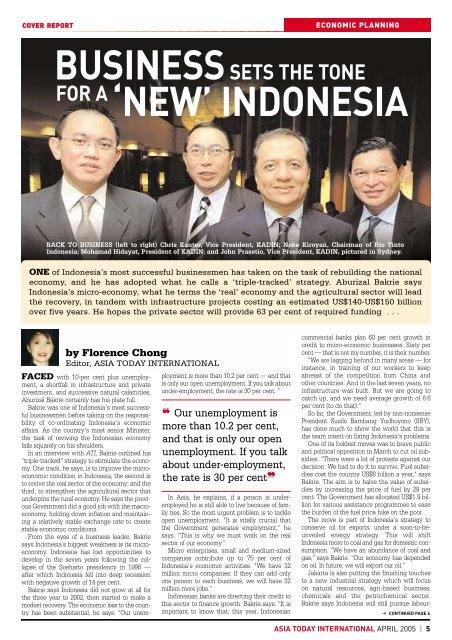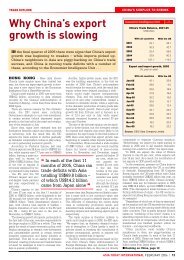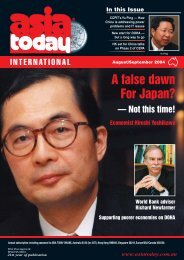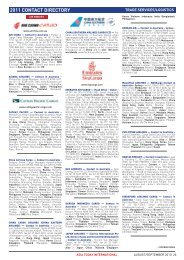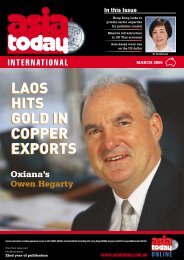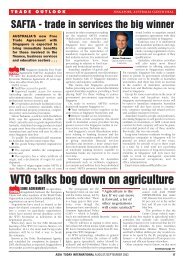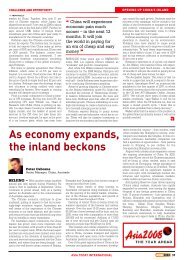indonesia - Asia Today International
indonesia - Asia Today International
indonesia - Asia Today International
You also want an ePaper? Increase the reach of your titles
YUMPU automatically turns print PDFs into web optimized ePapers that Google loves.
COVER REPORTECONOMIC PLANNINGBUSINESS SETS THE TONEFOR A‘NEW’ INDONESIABACK TO BUSINESS (left to right) Chris Kanter, Vice President, KADIN; Noke Kiroyan, Chairman of Rio TintoIndonesia; Mohamad Hidayat, President of KADIN; and John Prasetio, Vice President, KADIN, pictured in Sydney.ONE of Indonesia’s most successful businessmen has taken on the task of rebuilding the nationaleconomy, and he has adopted what he calls a ‘triple-tracked’ strategy. Aburizal Bakrie saysIndonesia’s micro-economy, what he terms the ‘real’ economy and the agricultural sector will leadthe recovery, in tandem with infrastructure projects costing an estimated US$140-US$150 billionover five years. He hopes the private sector will provide 63 per cent of required funding . . .by Florence ChongEditor, ASIA TODAY INTERNATIONALFACED with 10-per cent plus unemployment,a shortfall in infrastructure and privateinvestment, and successive natural calamities,Aburizal Bakrie certainly has his plate full.Bakrie was one of Indonesia's most successfulbusinessmen before taking on the responsibilityof co-ordinating Indonesia's economicaffairs. As the country's most senior Minister,the task of reviving the Indonesian economyfalls squarely on his shoulders.In an interview with ATI, Bakrie outlined his"triple-tracked" strategy to stimulate the economy.One track, he says, is to improve the microeconomiccondition in Indonesia; the second isto revive the real sector of the economy; and thethird, to strengthen the agricultural sector thatunderpins the rural economy. He says the previousGovernment did a good job with the macroeconomy,holding down inflation and maintaininga relatively stable exchange rate to createstable economic conditions.From the eyes of a business leader, Bakriesays Indonesia’s biggest weakness is its microeconomy.Indonesia has lost opportunities todevelop in the seven years following the collapseof the Soeharto presidency in 1998 —after which Indonesia fell into deep recessionwith negative growth of 14 per cent.Bakrie says Indonesia did not grow at all forthe three year to 2002, then started to make amodest recovery. The economic loss to the countryhas been substantial, he says. "Our unem-ployment is more than 10.2 per cent — and thatis only our open unemployment. If you talk aboutunder-employment, the rate is 30 per cent. "❝ Our unemployment ismore than 10.2 per cent,and that is only our openunemployment. If you talkabout under-employment,the rate is 30 per cent❞In <strong>Asia</strong>, he explains, if a person is underemployedhe is still able to live because of familyties. So the most urgent problem is to tackleopen unemployment. "It is vitally crucial thatthe Government generates employment,” hesays. “This is why we must work on the realsector of our economy."Micro enterprises, small and medium-sizedcompanies contribute up to 75 per cent ofIndonesia's economic activities. "We have 32million micro companies. If they can add onlyone person to each business, we will have 32million more jobs."Indonesian banks are directing their credit tothis sector to finance growth. Bakrie says: "It isimportant to know that, this year, Indonesiancommercial banks plan 60 per cent growth incredit to micro-economic businesses. Sixty percent — that is not my number, it is their number."We are lagging behind in many areas — forinstance, in training of our workers to keepabreast of the competition from China andother countries. And in the last seven years, noinfrastructure was built. But we are going tocatch up, and we need average growth of 6.6per cent (to do that)."So far, the Government, led by non-nonsensePresident Susilo Bambang Yudhoyono (SBY),has done much to show the world that this isthe team intent on fixing Indonesia's problems.One of its boldest moves was to brave publicand political opposition in March to cut oil subsidies."There were a lot of protests against ourdecision. We had to do it to survive. Fuel subsidiescost the country US$8 billion a year," saysBakrie. The aim is to halve the value of subsidiesby increasing the price of fuel by 29 percent. The Government has allocated US$1.9 billionfor various assistance programmes to easethe burden of the fuel price hike on the poor.The move is part of Indonesia's strategy toconserve oil for exports, under a soon-to-beunveiledenergy strategy. This will shiftIndonesia more to coal and gas for domestic consumption."We have an abundance of coal andgas,” says Bakrie. “Our economy has dependedon oil. In future, we will export our oil."Jakarta is also putting the finishing touchesto a new industrial strategy which will focuson natural resources, agri-based business,chemicals and the petrochemical sector.Bakrie says Indonesia will still pursue labour-➔ CONTINUED PAGE 6ASIA TODAY INTERNATIONAL APRIL 2005 | 5


